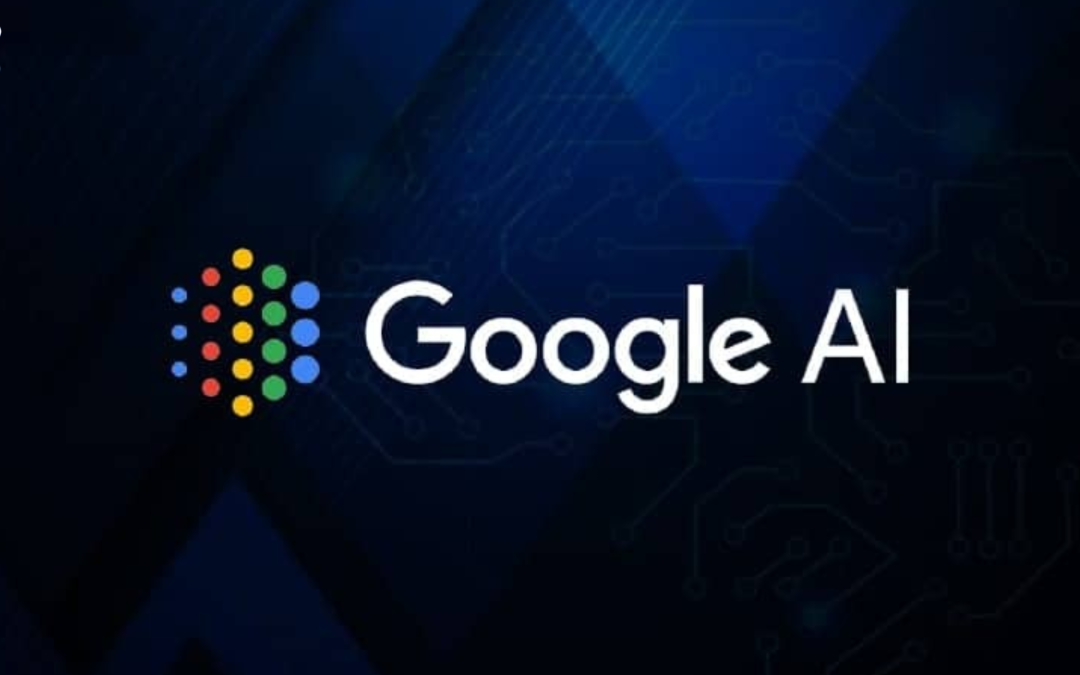Are you curious about why some websites appear in Google’s AI Overviews? Let’s break down the types of sites that Google loves and why they get featured.
Introduction — How AI Is Changing Google Search
Google is transforming how we search through the use of AI Overviews, which display complete solutions directly on top of the search results. In this manner, people regularly get what they need without having to click any hyperlinks.
In reality, recent data show that over 50% of Google searches now consist of AI Overviews, and this number has doubled since August 2024. As a result, many websites are experiencing fewer clicks—even when they rank #1. A single glance revealed that click-through costs had dropped from 7.3% to 2.6% for a few top-ranking pages.
These adjustments indicate that to remain visible, it’s no longer sufficient to rank highly — your content must be useful, trusted, and potentially even recommended by Google’s AI to appear in the Overview itself.
Analyzing the Most Visible Domains in AI Overviews
Who’s Getting Cited the Most?
This chart shows which websites Google’s AI uses most when generating its summary answers. Notice the big bars at the top—those are the platforms that Google AI trusts most.
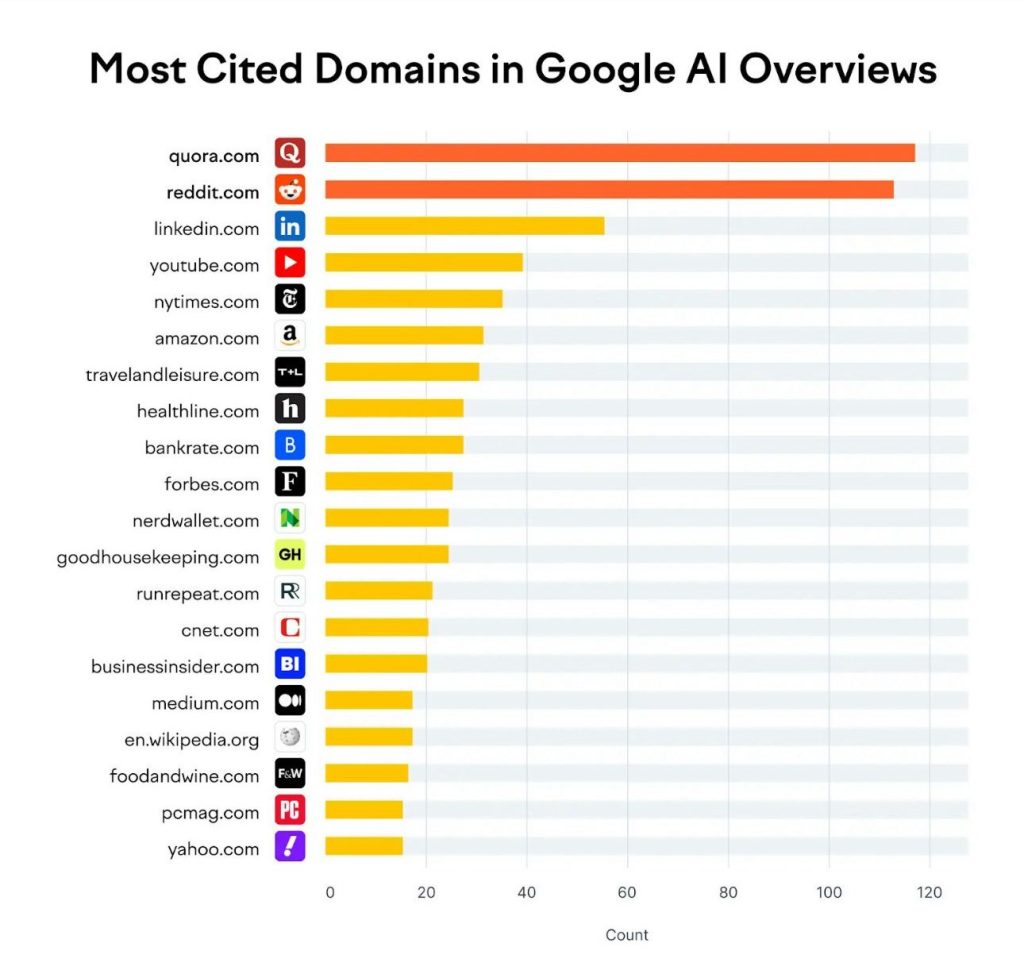
What the Data Tells Us
- Quora and Reddit: stand out, demonstrating that Google AI prioritizes genuine, in-depth answers from users who share personal experiences or offer solutions. Reddit is cited in about 21% of AI Overviews, and Quora follows closely behind.
- LinkedIn, YouTube, and Wikipedia: These sources appear in 13–18% of AI Overviews, suggesting that Google relies on platforms that offer professional knowledge, instructional videos, and factual content.
- Publishers like Forbes, The New York Times, and Healthline, although fewer in number, still appear in the cut, showing that Google uses some high-authority, expert-backed sites to support its summaries.
Trends by Content Type
When we examine the websites that appear most frequently in Google’s AI Overviews, we notice a clear pattern in the types of content they offer. First, websites like Reddit and Quora are filled with real people answering genuine questions. Google seems to love this because it shows what actual users think and do — not just facts but real experiences and opinions. That’s why these Q&A-style platforms are often cited as examples.
Next, we see YouTube ranking high on the list. This indicates that Google’s AI also prioritizes video content. Why? Because videos are great for explaining things step by step, showing how something works, or teaching a new skill. Whether it’s a cooking recipe or fixing a phone, YouTube videos give users visual learning that’s easy to understand.
Additionally, there are websites such as LinkedIn, Wikipedia, and Forbes. These platforms are recognized for their expertly written articles, research-based content, and trustworthy information. So, when a question requires a more serious or factual answer, Google AI selects content from these sources to ensure it provides the most accurate and helpful response.
In simple terms, Google AI selects a mix of content styles — real user advice, helpful videos, and expert knowledge — based on the question asked. Businesses that hire AI developers can better tailor their content to these formats, increasing their chances of appearing in AI Overviews.
Why Certain Domains Stand Out
When you search for something on Google, especially now with Google AI Overviews, you’ll notice some websites keep popping up more than others. This isn’t random. Google’s AI prefers certain trusted, high-quality websites — and there are three big reasons why.
Let’s break them down in a simple way.
Authenticity & User Experience
Quora and Reddit are winning the AI game because they feel real. These platforms are filled with real people sharing their own stories, tips, and honest experiences. Google’s AI picks up on this and shows it in overviews because it’s what users trust.
According to a study by Authoritas,
🔹 Quora appeared in 8.68% of AI Overviews
🔹 Reddit appeared in 7.31% of the time
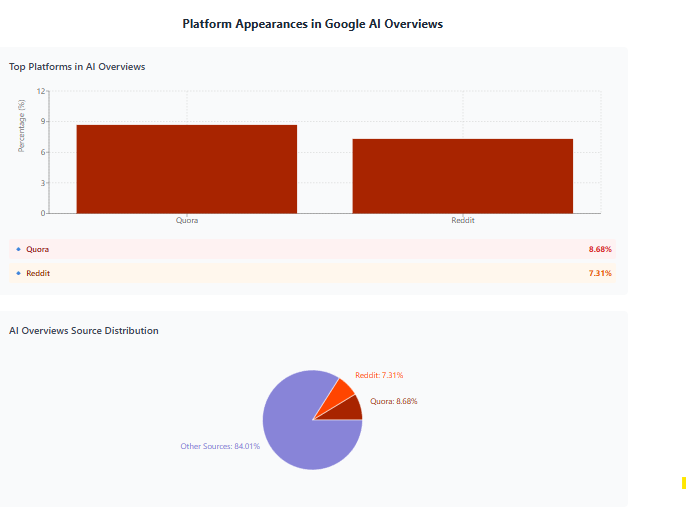
These numbers demonstrate that user-generated content is becoming increasingly important in SEO for AI-driven searches.
SEO Tip:
To stand out like Quora or Reddit, your content needs to be helpful, conversational, and genuine — not robotic or overly formal.
Trust and Expertise
When it comes to trusted websites on Google, platforms like LinkedIn and Wikipedia are at the forefront. Why? Because:
- LinkedIn features authentic author profiles, detailed job roles, and verified work history.
- A large number of editors update Wikipedia and back up every claim with references.
From the same report:
🔹 LinkedIn showed up in 8.74% of AI Overview results
🔹 Wikipedia appeared in 12.66% — the highest among all sites
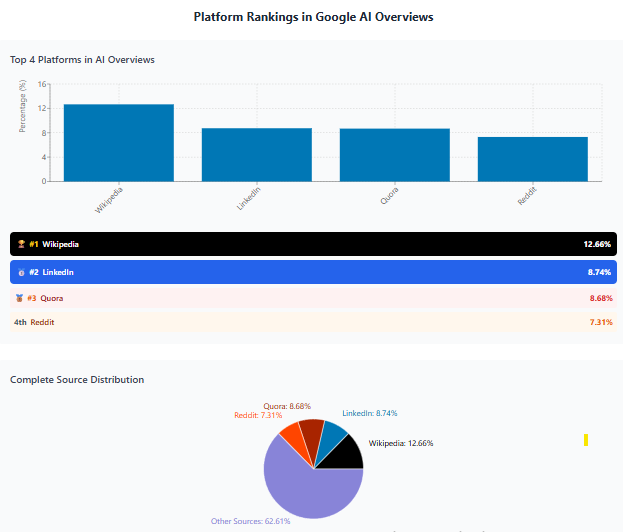
This indicates that Google AI prioritizes sources with clear authorship and factual depth.
SEO Tip:
Add author bios, mention credentials, and include links to trusted sources on your page.
Topic Relevance and Specialization
Not all websites show up in every type of search. Some are only used in specific niches, such as health, finance, business, or education.
For example:
- Healthline appears in medical or wellness topics
- Investopedia shows up for finance-related searches
- Edutopia may appear for education-based queries
🔹 Niche-specific domains like Healthline, Investopedia, and Mayo Clinic were cited in over 60% of health-related AI Overviews
🔹 Sites with a clear niche focus have a 4x higher chance of appearing in their category vs general websites This means specialized content matters more than ever.
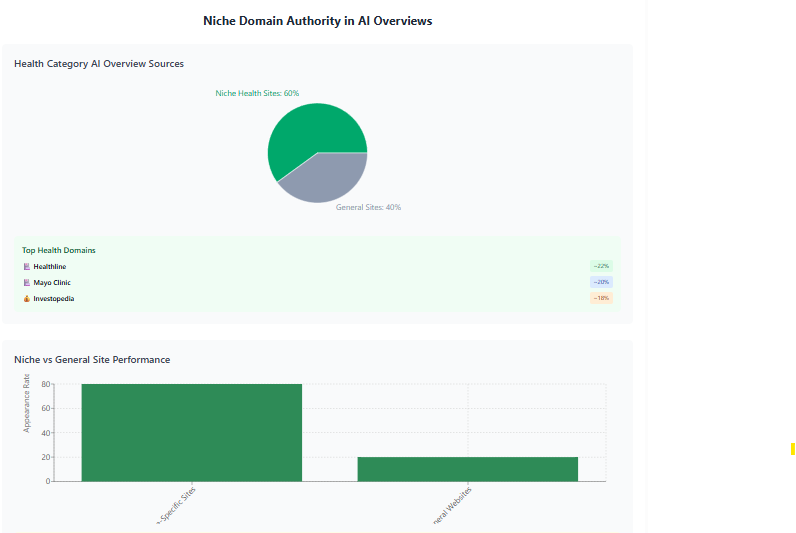
If you run a niche blog or business, focus on writing in-depth, specific content for that topic — don’t try to cover everything.
What This Means for Your Content Strategy
Google’s AI Overviews are changing the rules. Ranking high isn’t just about keywords anymore. If you want your content to be picked up by AI, it needs to be more helpful, smarter, and easier to read.
Let’s break down what that means.
It’s Not About Keywords Anymore
Forget about just stuffing keywords.
Today, your content must be:
- Useful → It should help the reader
- Shareable → People should want to save or repost it
- Relevant → Must match the searcher’s intent exactly
Think Like Google AI: What Would It Cite?
Google’s AI selects content that is both informative and understandable.
Here’s what works best:
- Add data and statistics
- Answer the search intent clearly
- Use visuals or charts
- Back up claims with source links
🔹 AI Overviews were 4x more likely to cite pages that had at least one data point or visual chart
🔹 Pages with sources and outbound links were 2.6x more cited than those without
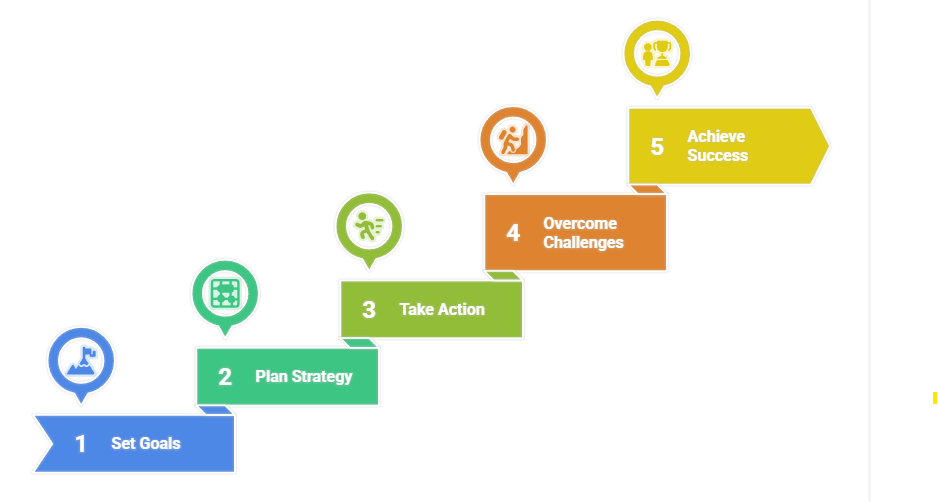
Formats That Work
Some content formats are favoured more by Google’s AI:
✅ Q&A Format → Like FAQs or “People Also Ask” style answers
✅ Expert commentary → Featuring real opinions or quotes
✅ Bullet-point summaries → Quick to scan and understand
✅ Videos and image explanations → Google AI pulls from YouTube and explainer sites
SEO Shifts – Visibility vs Clicks
Google AI Overviews are changing the way SEO works.
Before, if your page ranked on Google, people would click it.
But now? Even if AI uses your info, you may not get clicks unless your website is directly cited.
Let’s explore what that means — and how to adapt.
AI Overviews May Skip Your Page — Unless You’re Cited
AI Overviews often summarise your content, but they don’t link to your site unless you’re considered credible or have been cited.
Even if your blog has great info, if it’s not structured well or seen as authoritative, it won’t appear in that box.
🔹 Only 39% of AI Overviews include clickable links
🔹 Of those, over 75% link to high-authority or structured content (like Wikipedia, LinkedIn, Reddit, or Healthline)
🔹 Blogs and small sites make up less than 10% of cited links
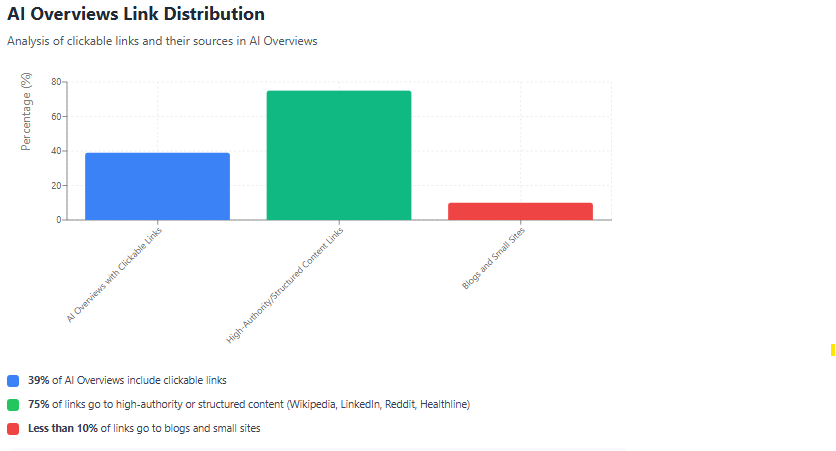
Authority and Structure Matter More Than Ever
Google AI cares less about flashy design and more about:
- Clear headings and subheadings (H2/H3)
- Structured layout (short paragraphs, bullet points)
- Author bio and real credentials
- Accurate, fact-checked content
- Outbound links to trusted sources
🔹 Pages with structured layout and clear headers are 2.8x more likely to be cited in AI Overviews
🔹 Articles with author names and bios have +40% better visibility in AI and SGE
🔹 Structured blogs (FAQs, summaries, H2s) get +22% more impressions on search
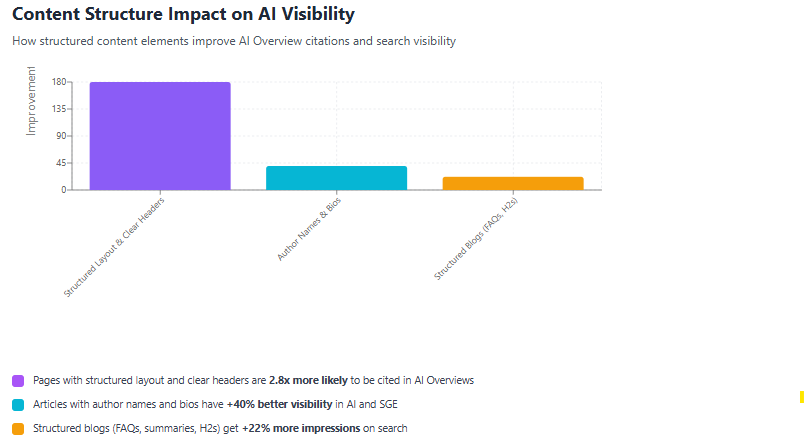
Google’s AI Overviews are changing the way SEO works — it’s no longer just about keywords and rankings. Now, it’s about creating valuable, trustworthy, and well-structured content that AI finds useful enough to mention and cite.
Whether you’re running a blog, business site, or niche platform, you need to focus on:
- Writing helpful content that truly answers user intent
- Backing your claims with stats, visuals, and sources
- Structuring your page with clear headings, summaries, and internal links
- Staying relevant to your topic and keeping content updated
In short, think like Google AI: Would it quote your page?
If yes — that’s the kind of content that will win visibility, clicks, and trust.
FAQ’s
1. What are Google AI Overviews, and why are they important?
Google AI Overviews are short summaries that appear at the top of search results. They give users quick answers by pulling content from trusted websites. If your page is cited in an overview, it boosts your visibility and builds trust — even if you’re ranking #1.
2: Why do websites like Wikipedia, Reddit, or LinkedIn appear more often?
These websites have structured, trusted, and informative content. Reddit and Quora offer real user experiences, while Wikipedia and LinkedIn provide expert facts and verified authorship. Google AI prefers such platforms because they feel genuine and useful.
3. How can I get my website to appear in an AI Overview?
Focus on writing clear, helpful content. Use proper headings, include stats and sources, link to other trusted pages, and add author bios. Also, keep your content updated and relevant to your niche to increase your chances of being cited.
4: Do I still need to use keywords for AI Overviews?
Yes, but keyword stuffing is no longer effective. Use your main keyword naturally and focus more on answering what users are searching for. Google AI seeks out helpful content that solves a problem, not just repetitive words.
5: What types of content formats does Google AI prefer?
Google AI prefers content that is easy to understand — such as FAQs, Q&A format, expert quotes, bullet-point summaries, and videos. These formats help the AI pick out quick answers and trustworthy information for the overview box.
